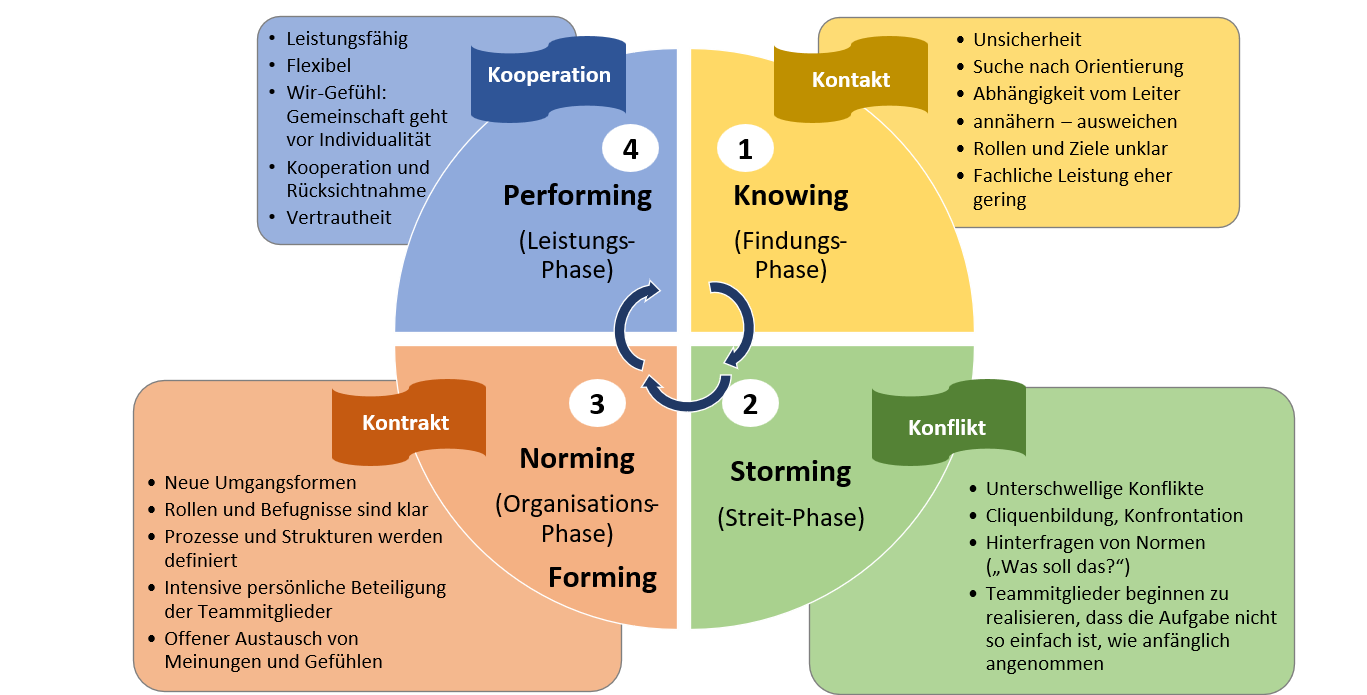Team Development Clock
Recognize and understand the 4 phases of team development.

The team development clock is a phase model for team development and was developed in the 1960s by the American psychologist Bruce Tuckman. The 4 steps of development are described that a group goes through when completing a task or when carrying out a project.
It is important to mention that the trainer or leader of the group is not part of it!
The individual phases of the team development clock are described in more detail below.

Contact Phase
The contact phase (also known as the knowing or discovery phase) is used for orientation. Since the group members do not usually know each other, interaction is usually reserved and formal. In this phase, it is important to give each participant their space and, if necessary, encourage them so that they can present themselves in the best possible way. Because there are still no clear goals and more precise processes, the technical performance of the group is still very low at this stage.
The task of the trainer / supervisor is to inform the group about the technical processes and to support them in the introductory phase so that the participants quickly feel comfortable. It is important that the finding phase does not take up too much time so that you can quickly switch to the second phase.
Conflict Phase
The conflict phase (also known as the storming or argument phase) is the culmination of group dynamics. The group members get to know each other better and notice who they get along with and who they don't get along with so well. Interests are represented, coalitions are formed and norms are questioned. As a result, smaller groups naturally form and tensions and conflicts arise. In this phase, too, the group performs poorly, if at all, because their focus is increasingly on the problems within the group.
The so-called trainer testing / trainer battles also take place in this phase . A strategic procedural question makes it possible to channel the conflicts and initiate group formation in a controlled manner.
The task of the trainer / supervisor is to find a healthy middle ground between mediating and driving the group forward. The conflicts should be addressed directly and each participant should be allowed to express his or her opinion. In this way, the trainer creates an open climate and at the same time prevents escalation. This is important to get the group back on track and focus on the project goals.
Contract Phase
The contract phase (called norming or organization phase) is the third phase of the team development clock. By resolving the conflicts in phase 2, the roles are distributed within the group . This promotes solution-oriented work and the first results are achieved.
The task of the trainer / supervisor is now to accompany the group. He changes to the role of the coach. The main thing now is task orientation.
Cooperation Phase
In the cooperation phase (also known as the performing or performance phase), the group works productively. The members work goal-oriented. Individual interests are pushed back in order to achieve the common goal.
The group treats each other with respect. She now knows her group members very well and appreciates each participant individually.
The trainer should now withdraw a little so that the individual participants can develop further and the targets can be achieved. He hardly needs to intervene in the interaction of the group.